It’s possible that I shall make an ass of myself. But in that case one can always get out of it with a little dialectic. I have, of course, so worded my proposition as to be right either way (K.Marx, Letter to F.Engels on the Indian Mutiny)
Friday, October 09, 2020
By Munsif Vengattil
(Reuters) - International Business Machines Corp is splitting itself into two public companies, capping a years-long effort by the world’s first big computing firm to diversify away from its legacy businesses to focus on high-margin cloud computing.
IBM will list its IT infrastructure services unit, which provides technical support for 4,600 clients in 115 countries and has a backlog of $60 billion, as a separate company with a new name by the end of 2021.
The new company will have 90,000 employees and its leadership structure will be decided in a few months, Chief Financial Officer James Kavanaugh told Reuters.
IBM, which currently has more than 352,000 workers, said it expects to record nearly $5 billion in expenses related to the separation and operational changes.
Investors cheered the surprise move by Chief Executive Officer Arvind Krishna, the key architect behind IBM’s $34 billion acquisition of cloud company Red Hat last year, sending the company’s shares up 7%.
“We divested networking back in the ‘90s, we divested PCs back in the 2000s, we divested semiconductors about five years ago because all of them didn’t necessarily play into the integrated value proposition,” Krishna said on a call with analysts.
BIG BLUE’S NEW FOCUS
In a blog, Krishna called the move a “significant shift” in the 109-year-old company’s business model.
“IBM is essentially getting rid of a shrinking, low-margin operation given the cannibalizing impact of automation and cloud, masking stronger growth for the rest of the operation,” Wedbush Securities analyst Moshe Katri said.
IBM, which has sought to make up for slowing software sales and seasonal demand for its mainframe servers, said it would now focus on open hybrid cloud and AI solutions that will account for more than half of its recurring revenues.
Krishna, who replaced Ginni Rometty as CEO in April, said IBM’s software and solutions portfolio would account for the majority of company revenue after the separation.
The company also said it expects third-quarter revenue of $17.6 billion and an adjusted profit per share of $2.58, roughly in line with Street estimates.
Reporting by Munsif Vengattil in Bengaluru; Editing by Ramakrishnan M.
House Democrats tackle Big Tech "monopolies"
Ashley Gold, Kyle Daly, Scott Rosenberg

Illustration: Eniola Odetunde/Axios
The House Judiciary Committee says Amazon, Apple, Facebook and Google are monopolies — but its new plan to rein in their power won't change anything overnight. Instead, Democratic lawmakers propose to rewrite American antitrust law in order to restructure the U.S.'s most successful and powerful industry over time.
The big picture: The report is a long pass down the field of the tech industry's unfolding conflicts. It could be game-changing — but it also might never get completed.
Driving the news: The report, which runs more than 450 pages, proposes broad updates to antitrust law, including:
limiting companies' ability to compete unfairly against third parties on their own platforms by either requiring online marketplaces to be independently run businesses or establishing rules for how such marketplaces can be organized;
blocking online platforms from giving themselves preferential treatment or playing favorites with other content providers;
requiring social networks to be interoperable so that people can communicate across platforms and carry their data over from one platform to another;
directing antitrust enforcers to assume that an acquisition by a dominant tech firm is anticompetitive unless proven otherwise; and
allowing news publishers to team up to negotiate against tech platforms looking to carry their content.
Committee investigators spent 16 months reviewing mountains of emails, memos and other evidence to reach these conclusions about the companies:
Amazon: The internet retail giant achieved its dominant position in part through acquiring competitors; has a monopoly over and mistreats third-party sellers; and has created a conflict of interest through its double role as an operator of its marketplace and also a seller there.
Apple: The report says Apple exerts monopoly power over software distribution to more than half the mobile devices in the U.S. It accuses the company of exploiting rivals by levying commissions and fees and copying apps, and says Apple gives preference to its own apps and services.
Facebook: The social media network has monopoly power in the social networking space, the report finds, and takes a "copy, acquire, kill" approach to would-be rivals such as WhatsApp and Instagram, both of which it bought in the early 2010s.
Google: The search engine has a monopoly in the general online search and search advertising markets, according to the report, maintaining its position through anticompetitive tactics such as undermining vertical search providers and acquiring rivals.
What they're saying: "To put it simply, companies that once were scrappy, underdog startups that challenged the status quo have become the kinds of monopolies we last saw in the era of oil barons and railroad tycoons," write the authors of the report.
The other side: The companies all deny that they hold monopoly positions or that their practices and acquisitions violate antitrust law, and argue that the tech industry remains healthily competitive.
Why it matters: Responsibility for enforcing antitrust law lies with prosecutors at Justice and the states and with federal agencies, not with Congress. But if Democrats take the White House and the Senate in November, they could use this report as a blueprint for longer-term legislative and enforcement changes to limit tech giants' power.
Republicans on the committee offered two rival reports, focusing more on complaints of conservative bias on the part of social media platforms than on antitrust concerns, which their business-friendly party has a long tradition of discounting.
Our thought bubble: "Breaking up big tech" has been a longtime rallying cry among tech critics. Although the report offers potential rationales for unwinding acquisitions like Facebook's purchases of Instagram and WhatsApp, such outcomes remain unlikely — and would ultimately have to come from a court.
Yes, but: Many of tech's sharpest critics are enthusiastic about the report anyway. That's partly because they agree with so much of it. But it's also because they see it as a road map toward a healthier, less centralized industry.
What's next: Later this week or next week, the Justice Department is expected to file its long-gestating lawsuit against Google — kicking off tech's first major antitrust fight in two decades.
Congress says Big Tech wields monopoly power
BY IRINA SLAV · OCTOBER 7, 2020
An investigation by Congress has found Amazon, Facebook, Google, and Apple have “monopoly power” that they have abused.
CNN’s Brian Fung reported:
A 16-month congressional investigation into Amazon, Apple, Google and Facebook has found that the tech giants hold “monopoly power” in key business segments and have abused their dominance in the marketplace, in a full-throated condemnation of the giants.
The findings set the stage for possible future legislation designed to rein in Big Tech, even as antitrust enforcers at the Justice Department and the Federal Trade Commission gear up for potential litigation against some of the companies.
Cecilia Kang and David McCabe from the New York Times wrote:
To amend the inequities, the lawmakers recommended restoring competition by effectively breaking up the companies, emboldening the agencies that police market concentration and throwing up hurdles for the companies to acquire start-ups. They also proposed reforming antitrust laws, in the biggest potential shift since the Hart-Scott-Rodino Act of 1976 created stronger reviews of big mergers.
US tech companies have faced increased scrutiny in Washington over their size and power in recent years. The investigation by the House Judiciary Committee is just one of multiple probes firms such as Facebook and Apple are facing.
The 449-page report, penned by committee staff, accused the companies of charging high fees, forcing smaller customers into unfavourable contracts and of using “killer acquisitions” to hobble rivals.
“To put it simply, companies that once were scrappy, underdog startups that challenged the status quo have become the kinds of monopolies we last saw in the era of oil barons and railroad tycoons,” it said.

Oct 6, 2020,
What do this year’s winners of the Nobel Prize in Physics have in common (besides winning the Nobel Prize, that is)? All three of this year’s winners — Sir Roger Penrose, Reinhard Genzel, and Andrea Ghez — focused their research on black holes, in the process bringing humanity one step closer to unraveling “The Milky Way’s darkest secret,” according to the Nobel Foundation.
The three newly minted Nobel Laureates split the Physics award two ways, with Penrose being honored individually “for the discovery that black hole formation is a robust prediction of the general theory of relativity,” while Genzel and Ghez shared the prize “for the discovery of a supermassive compact object at the centre of our galaxy” — an object that, you guessed it, can only be explained by current research as nothing other than a black hole.

#VELIKOVSKY WAS RIGHT
Along with Hawking and a handful of other physicists of the post-Einstein generation, Penrose is responsible for much of the current scientific consensus that describes and speculates on the way that black holes form and behave. In 2018, he theorized that other “dead” universes may very well predate our own, interpreting Cosmic Microwave Background radiation data to suggest that faint signatures of those older universes’ dead black holes still linger from the cosmic event that created this one.
The Nobel Foundation recognized Genzel and Ghez jointly for positing that the center of the Milky Way is anchored by a supermassive unseen object. “Their pioneering work has given us the most convincing evidence yet of a supermassive black hole at the centre of the Milky Way,” according to the Nobel Foundation.
Each physicist leads “a group of astronomers that, since the early 1990s, has focused on a region called Sagittarius A* at the centre of our galaxy,” the Foundation explained. “The orbits of the brightest stars closest to the middle of the Milky Way have been mapped with increasing precision. The measurements of these two groups agree, with both finding an extremely heavy, invisible object that pulls on the jumble of stars, causing them to rush around at dizzying speeds…Stretching the limits of technology, they refined new techniques to compensate for [telescopic] distortions caused by the Earth’s atmosphere, building unique instruments and committing themselves to long-term research.”
It might have taken decades for each scientist to earn the prize, but they’d likely be the first to acknowledge that, in the grand scheme of things, that’s less than a nano-blip on the boundless cosmic clock. It just goes to show that, when it comes to answering questions that may be older than the universe itself, persistence pays off. “The discoveries of this year’s Laureates have broken new ground in the study of compact and supermassive objects,” wrote David Haviland, chair of the Nobel Committee for Physics. “But these exotic objects still pose many questions that beg for answers and motivate future research.”
Sounds like a pep talk to start thinking about a STEM career. Or, if you already happen to be a Nobel Laureate, to roll up your sleeves and get right back to work.
Trump's tactics are working
Much of the world has been appalled by the behavior of US President Donald Trump since he was diagnosed with COVID-19. But his supporters love it, writes DW's Ines Pohl from the state of Ohio.

"I could stand in the middle of Fifth Avenue and shoot somebody and wouldn't lose any voters," Trump boasted notoriously at the beginning of the 2016 election campaign.
The president hasn't yet shot anyone in New York, but his recent reckless behavior after testing positive for the coronavirus comes pretty close.
After two days in hospital and at a time when he was almost certainly still contagious, he got into the back of his black presidential limo, nicknamed "The Beast," and put his security staff at risk in order to drive by his fans. Wearing a black mask and an open shirt, he smiled and waved victoriously.
The next day, he returned to the White House and removed his mask triumphantly at the top of the steps leading to the White house balcony as he posed for the cameras. "Don’t be afraid of Covid," he had tweeted before leaving the hospital. "Don’t let it dominate your life."
He said that he was "feeling great," with the underlying suggestion being that the virus was not the potential threat to life that his political rivals depicted it as.
Read more: Donald Trump has a coronavirus infection: What happens next?
Far-reaching Supreme Court decision
From across the Atlantic, one might think that Trump's recent behavior alone would be enough to ensure that he does not win the upcoming election. But here on the ground, that is not so obvious.
To understand US voters, one has to remember, among other things, the importance of the president's role in nominating Supreme Court justices, who have life tenure and can determine the country's political direction for decades to come. Their influence can be much more powerful and lasting than that of a president, who is in office for a maximum of eight years, two of which at least tend to be spent on the campaign trail.
In addition, some 25% of US voters are opposed to women having the right to an abortion. They do not care what presidents do or say so long as they fight against this right. Although Trump has been known to change course and backtrack often, he has been unwavering when it comes to this issue.
He has also been unwavering with regard to generous tax breaks benefiting the upper-middle classes and the super-rich, who already have plenty — but seem to need more.
Read more: US: Donald Trump halts coronavirus stimulus talks until after election

So-called pro-lifers, or anti-abortion activists, are some of President Trump's most vocal supporters
A defender of white America
Then there are the many Americans who didn't really know where they belonged in a country whose current white majority will likely be a minority in less than 25 years' time. But that was before Trump arrived on the scene as a political outsider and successor to the first Black president in US history. He has capitalized on racist fears, seeming to stand as a guarantee for the preservation of white America, among other things through his curbs on immigration and an apparent reluctance to condemn white supremacist movements. He also appealed to working-class whites by promising to bring back jobs that had been outsourced to other countries and to restore former industrial hubs to their past glory.
Such supporters were shocked when their superhero caught the virus and seemed to falter. And Trump's reckless behavior was part of a grand strategy to reassure them that all is well — he needs their unflinching support if he is to have any chance of being reelected. And his tactics have worked.
Read more: White House COVID-19 outbreak widens, as cases mount
Trump's election to lose
As for the others — such as Black people whose relatives have died because they did not have access to the same medical treatment as Trump or those who cannot fathom why the president has still not made it mandatory to wear masks nationwide — he simply doesn't care, because he knows that he cannot win them over.
This might all seem completely crazy from a distance. But it is apparent that Donald Trump's tactics are working among large swaths of the US public. No matter what happens, as long as he stays healthy enough to keep up his little games, Trump's supporters will continue to root for him.
What will be decisive in the end is whether Trump's behavior will motivate enough people to vote him out of the Oval Office, as Joe Biden on his own is not attractive enough to draw undecided Democrats and unwilling voters to the polling stations.
This article was translated from German.
Beijing is angry after many countries supported a Germany-led initiative to condemn rights violations in the country. UN diplomats told DW that China's pressure tactics have failed, at least this time around.

In the declaration drafted by Germany and presented at the UN General Assembly in New York on Tuesday, 39 predominantly Western countries denounced China for gross human rights violations in the western Chinese province of Xinjiang and the autonomous region of Tibet, and for limiting political and personal freedoms in Hong Kong.
In the statement endorsed by the UK, the US and many EU countries, Germany's ambassador to the UN, Christoph Heusgen, decried the "widespread surveillance [that] disproportionately continues to target Uighur and other minorities" as well as "forced labor and forced birth control including sterilization." He also criticized the existence of political re-education camps in Xinjiang, where more than a million people had reportedly been detained.
Regarding Hong Kong, the German ambassador expressed "deep concerns" about elements of the recently enacted national security law, which allowed for certain cases to be transferred for prosecution to mainland China. He also demanded that Beijing ensure "freedoms of speech, press and assembly."
An angry response
China's ambassador to the UN, Zhang Jun, responded with an irate statement, saying the accusations were "groundless" and that his country "opposes interference in internal affairs." In separate statements, Pakistan and Cuba voiced their support for Beijing's position, as did a group of mainly African and Arab countries, Russia and Venezuela.
Beijing's anger was in part due to the fact that it had not anticipated such a surge in support for the declaration, according to a diplomat who spoke to DW on condition of anonymity.
Other officials, who also wished to remain unnamed, told DW that Beijing had not expected more than 30 countries to join and had begun a political pressure campaign to prevent countries from signing the statement.
In the end, 39 countries signed on to the declaration, 16 more than last year, with Bosnia and Herzegovina joining literally at the last minute. This was the result of weeks of lobbying by diplomats from Germany, the UK and the US, who clandestinely spoke to other UN states asking for their support. The list remained classified until minutes before Germany's UN ambassador Heusgen read the statement in New York, for fear signatories might be poached by China at the last moment.
Let's be friends, or else
China is known to play hardball with countries that it thinks are planning to sign on to international statements criticizing its activities. "Countries do report to us a significant amount of pressure, including threats around economic cooperation from China if support is not given", British Ambassador to the UN, Jonathan Allen, said in a press conference after Tuesday's UN meeting.
In 2019, for example, Beijing threatened to thwart Austria's attempts to find a new location for its embassy in the Chinese capital if it signed a declaration condemning the Asian superpower's human rights violations. Vienna signed the statement anyway, but another European signatory was cut off from Chinese economic support after endorsing the declaration.
On another occasion, Lebanon was told Beijing would oppose the extension of the UNIFIL peacekeeping mission in the country if it didn't side with China, a permanent member of the UN Security Council.
Read more: Why is Germany silent on China's human rights abuses?
Several UN diplomats told DW that they were being hounded by their Chinese counterparts in the run-up to issuing statements critical of the Asian country. One spoke about how aggressively she was pursued by a diplomat from Beijing. "They're in your face all the time," she said. "They call you, they text you, in the evenings, on the weekends, it's incessant."
One time, she recalls her Chinese counterparts deliberately creating a situation to intimidate her. "They would gang up on me, ask me to come outside where more of their colleagues were waiting, it was a three-on-one situation and they were really aggressive."
Several other diplomats, who wished to remain unnamed, told DW that Chinese embassy staff had, on various occasions, presented them with false information about what their superiors had allegedly agreed to, to wrest compliance.
DW reached out to the Chinese mission in the UN for comment, but is yet to receive a response.
Might is right
"Some countries are happy to be on China's side, like Russia, Syria, Cuba or Venezuela," Lou Charbonneau, United Nations director at Human Rights Watch (HRW), told DW, adding, "Others endorse China's position only because of fear of repercussions."
Indeed, China's aggressive tactics seem to work sometimes. Last year, Bahrain, Qatar, Oman, and Saudi Arabia supported a delicately formulated statement delivered by Kuwait, in which it spoke out in favor of human rights, but was careful not to antagonize China. This year, Saudi Arabia and Bahrain showed up with a similar announcement.
Read more: Are EU-China trade relations at a crossroads?
But Tuesday's UN statement shows that Beijing's tactics may be backfiring. In German ambassador Christoph Heusgen's words, "More and more countries are feeling increasingly uncomfortable with China."
However, Chinese influence is growing in poorer countries, like those in Africa, or in European countries like Greece, where it continues to invest heavily. This may have an impact on garnering international support against rights violations in the country.
But HRW's Charbonneau believes this strategy won't pay off in the long run and the number of countries critical of China over the country's human rights record will keep going up. "The more countries speak out, the more others feel they can do the same," he said.
"With every one of these statements and with every country that signs on to them, the political costs for China's non-compliance with international norms go up," Charbonneau underlined. "If they want to be part of the international community, they need to change."
DW RECOMMENDS
HRW says China poses 'dire' threat to human rights
Human Rights Watch has said that China is taking measures that will weaken systems protecting human rights around the world. The NGO's annual review was launched in New York after its director was barred from Hong Kong.
EU pushes China on trade, human rights at virtual summit
EU officials have called on Beijing to respect human rights and open its markets, saying they are fundamental requirements of the EU-Chinese relationship. The German Chancellor said it is high time to demand reciprocity.
China: Uighur women reportedly sterilized in attempt to suppress population
Two Uighur majority counties in Xinjiang province reportedly planned to sterilize between 14% and 34% of women aged between 18 and 49. Politicians around the world are calling on the UN to investigate the claims.
Should Germany import hydrogen or produce it at home?
As Germany plans a pathway to a low-carbon economy, experts argue over whether to replace its huge fossil hydrocarbon imports with imported renewable hydrogen or instead rely entirely on hydrogen made in Germany.
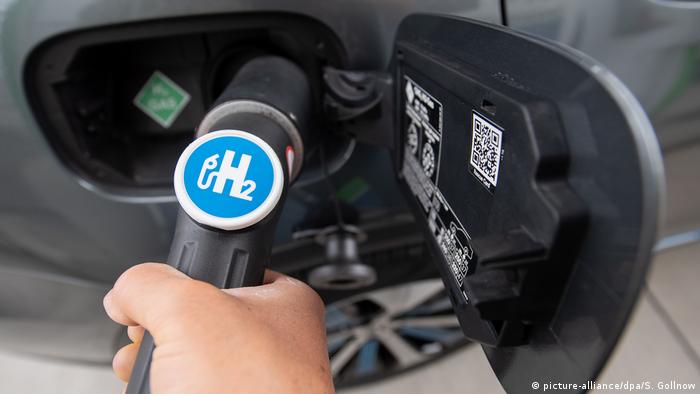
Jörg Steinbach, 64, is the minister for economy, jobs and energy for the state of Brandenburg, the region that surrounds — but does not include — the city of Berlin. Before that, Steinbach, a chemical engineer, spent eight years as president of technical universities in both Brandenburg and Berlin. This autumn, Brandenburg is developing a new hydrogen strategy under his enthusiastic direction.
"Hydrogen is going to be a major feature of the low-carbon clean energy economy we need to build in coming years. It will have multiple roles: powering heavy vehicles, ships, trains, eventually perhaps aircraft as well. It can replace natural gas for heating. It can replace coal in steelmaking," Steinbach told DW.
Read more: Why all the fuss about hydrogen?
Steinbach said in Germany, clean energy will be supplied primarily in two forms: First, electricity produced from wind and solar power, and second, hydrogen gas produced by using renewable electricity to split water into oxygen and hydrogen.
Hydrogen is thus a way of storing energy, an "energy carrier," and not a primary energy source.
Since taking office in 2018, Steinbach has been pushing for his state to become a clean technology leader — and with a gigantic new Tesla Gigafactory under construction on the outskirts of Grünheide, a village in Brandenburg southeast of central Berlin, he's off to a pretty good start.
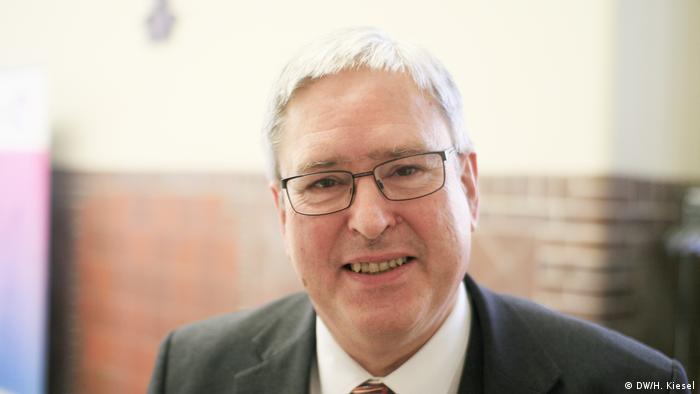
Steinbach: 'Hydrogen is going to be a major feature of the low-carbon clean energy economy'
A slew of regions vied for the privilege of hosting the first Tesla electric car factory in continental Europe. Brandenburg won the prize, helped along by the fact that Elon Musk, Tesla's hard-charging CEO, has a high regard for German engineering. He has often said that he loves Germany in general, and Berlin in particular. And now Tesla's initial investment in Germany is leading the company to make additional investments in other technologies as well.
Steinbach grinned when asked if he hopes to persuade additional clean technology companies to set up giant factories in Brandenburg, but he was cagey about details. "Our work on the hydrogen strategy is early stage. We're looking at a variety of applications," he told DW.
Germany is interested in powering locomotives with hydrogen fuel cells on rail lines that are not yet electrified, and is supporting the development of new hydrogen fuel cell-powered motors for powering heavy trucks. Renewable hydrogen will play a growing role as a feedstock for the chemical industry in the future and is expected to gradually replace coking coal in steelmaking, as well. There are even hydrogen-powered aircraft in development, though it will take many years before they're commercially available.
Hydrogen can also be pumped into existing natural gas pipelines and used for heating buildings — though the differing characteristics of hydrogen compared to methane, the main component of natural gas, means there are limits to how much hydrogen can be added to the existing gas network without causing technical problems. But "those problems can be solved by replacing some of the equipment," Steinbach said.
The state of Brandenburg isn't the only place that has a hydrogen strategy under development. Germany as a whole also has one, and so does the European Union. A key question for Germany and Europe is where hydrogen will come from in a zero-emissions future. Will it be domestically produced, or imported from overseas?
The likely answer: both. Peter Altmaier, Germany's minister of economy and energy, has supported hydrogen imports as well as domestic production.
E-fuels from the wind and sun
Jörg Steinbach told DW that he isn't particularly keen on seeing Germany import hydrogen. He wants it produced domestically. A key question, however, is whether Germans will balk at seeing many more wind turbines and solar panel fields set up to supply the huge amounts of additional electricity that will be needed as the car fleet and the building heating sector increasingly electrify over the coming two decades.
There is an alternative. In the mid-2000s, a research group at Germany's aerospace agency, DLR, calculated that covering the equivalent of 1% of the area of the Sahara desert with solar thermal power arrays would generate enough electricity to supply energy to the entire world, for all purposes. A consortium of German companies launched a project called Desertec to pursue the vision.
Read more: Could Morocco's megaplant revive dreams of Saharan solar?

Can Germans live with all the solar panels needed to supply the huge amounts of additional electricity?
But over the years, the price of solar photovoltaic panels has dropped so dramatically that installing solar panels in Germany has become cheaper than importing solar power from North Africa, despite the Germany's cloudier skies — producing domestic solar power doesn't require building long-distance transmission lines. The Desertec project has since faded from view.
Michael Sterner, an engineering professor in Bavaria who is an expert on "power-to-gas systems" for making clean hydrogen from renewable energy and water, believes Germany will eventually need to import clean energy from overseas, especially in the form of synthetic liquid fuels.
"It makes more sense to initially produce hydrogen regionally, as the state of Brandenburg intends to do. Value creation and jobs are created locally — the circular economy is strengthened," Sterner told DW. "However, I think we will also need to import hydrogen, or low-carbon liquid fuels made from it."
Sterner noted that Germany currently imports around two-thirds of its primary energy supply, nearly all of it in the form of fossil fuels, and so "if we develop green technologies for export and then import green energy produced with that equipment, that's a win-win for everyone — that trade reduces our export surplus, and is more sustainable than the old fossil fuels system."
By green technologies, Sterner means, for example, factories and machine tools for fabricating photovoltaic cells and panels or wind turbines; equipment for large-scale electrolysis of water to make hydrogen gas; and Fischer-Tropsch factories for making synthetic liquid hydrocarbons using renewable electricity as the energy input.
Why do whales and dolphins strand?
There have always been mass strandings of whales and dolphins. Worldwide, about 2,000 marine mammals die in this way every year. But the phenomenon is not always due to natural causes.
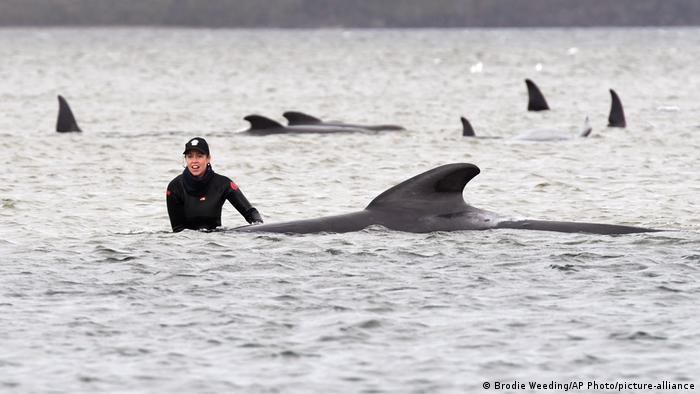
Which whales and dolphins tend to strand where?
Pilot whales, sperm whales, beaked whales and deep-sea dolphins are the marine mammals most commonly involved in mass strandings. Baleen whales, on the other hand, a group to which all big whales except the sperm whale belong, strand very rarely.
If these mammals become stranded, they can dry out, overheat, suffocate or suffer severe inner injuries because of their enormous dead weight.
Individual strandings have been observed at many locations, while most mass strandings have been registered in Western Australia, New Zealand (with up to 300 stranded whales annually), and on the east coast of North America and Patagonia (Chile). Occasionally, however, there are also mass strandings in the North Sea.
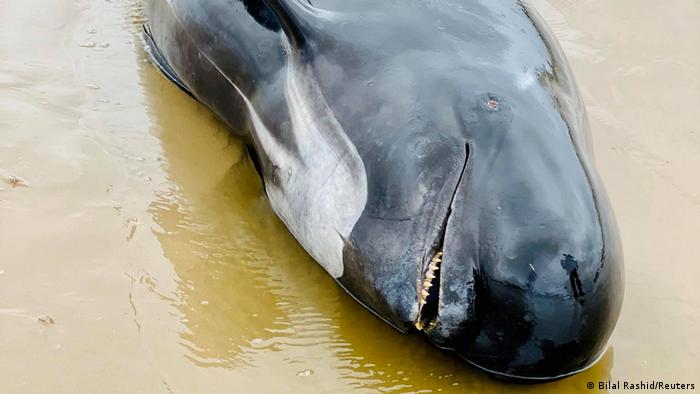
On land, the mammals can dry out, suffocate or suffer internal injuries from their enormous weight
How do whales and dolphins navigate?
Like migratory birds, some whale species travel great distances every year. In winter, whales migrate from the cold northern seas to warmer waters in the south, and whales from southern waters move to the north in the same season. Months later, they then begin to travel back home.
The smaller toothed whales, such as dolphins, have a powerful underwater sonar. They orient themselves on their journeys by emitting sound waves in the form of clicking noises. When these sound waves collide with an object, they are reflected back as echoes to the animals' ears, which in the case of whales are shielded from the skull in foam-filled chambers inside the body to enable spatial hearing. The faster the sound returns, the closer the prey, an obstacle or the coast.
However, in the case of the large baleen whales, which have horn plates (baleen) instead of teeth in their upper jaws for filtering krill, animal plankton and small fish from the water, this underwater sonar is not very highly developed.
This echolocation works very well as a rule. However, sound reflection does not function reliably in certain circumstances, particularly when there are shallow or semicircular bays, sandy underwater embankments or silt banks. These types of coasts and obstacles do not produce an unambiguous echo from any particular direction, so the warning system fails.
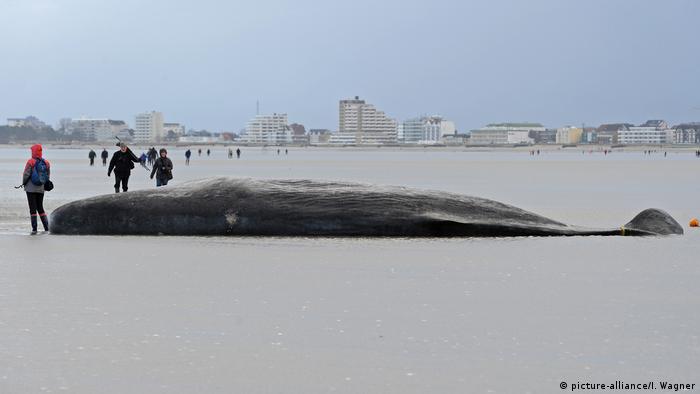
Even in the German Wadden Sea, whales like this not yet fully grown sperm whale are washed up from time to time
Whales such as the pilot whale do not use just underwater sonar to orient themselves, but — again, like migratory birds — seem to rely on the lines of the earth's magnetic field, as their migration routes often run parallel to those lines. The slight fluctuations of the earth's magnetic field appear to function like a kind of map.
Magnetite crystals have been found in the skulls of these animals. The whales could be confused by disturbances of the geomagnetic field near the coast. Magnetic fields running perpendicular to the mainland are also thought to play a role in mass strandings of whales in certain coastal regions.
Every few years, solar storms and sunspots that occur amid heightened activity on the sun's surface also cause fairly large changes in the Earth's magnetic field. It is at such times that sperm whales, for example, which also use geomagnetism as a natural navigation system, get lost and become stranded in the North Sea.
Why do whales and dolphins become stranded?
Navigational errors are thus believed to be the main cause of whale strandings, but all the reasons have not yet been conclusively investigated.
One of them is certainly the social behavior of many whale species, which travel in groups, so-called pods, and are guided by a leader. For example, in the case of sperm whales, a male leads the way from the Arctic Ocean back into warmer waters. By contrast, when orcas are on their travels, a mother or grandmother leads the group.
If leaders lose their orientation, perhaps because they are confused or because parasites have attacked their ears, rendering them incapable of hearing the echoes of the clicking sounds that have been sent, the accompanying animals will follow them in the wrong direction. If a leader is stuck in shallow waters, the rest of the group stays with it, even if this means their certain doom.
Sometimes, as has been observed, for example, with orcas on the South African coast, this group cohesion can go so far that whales who have already been saved after a mass stranding return to the beach if another stranded whale calls for help.
But strandings can also have other natural causes. Sometimes, smaller dolphins become beached because they have taken refuge from orcas and other predators in shallower waters or because they have ventured too far into shallow areas when hunting shoals of fish.
Occasionally, individual animals are also washed ashore dead after being previously injured by collisions with ships, fishing nets or shark attacks or becoming ill from infections or parasite infestation.

High-performance military sonar devices in particular massively impair the orientation of marine mammals
In addition to natural factors, man-made underwater noise from ships, icebreakers, drilling platforms or military sonar equipment can also massively impair the orientation and communication of marine mammals. They flee the strong sound waves in a state of confusion. And since the density of water is much higher than that of air, sound propagates underwater about five times faster than in the air.
Military sonar operations employing very loud sounds have particularly drastic effects. After NATO maneuvers, for example, beaked whales have washed up dead on the coasts of Cyprus, the Canary Islands and the Bahamas. The sonars, which are louder than 200 decibels, triggered the formation of gas bubbles in the blood vessels and organs of marine mammals (as happens with diving sickness), obstructing the blood supply and leading to their death.
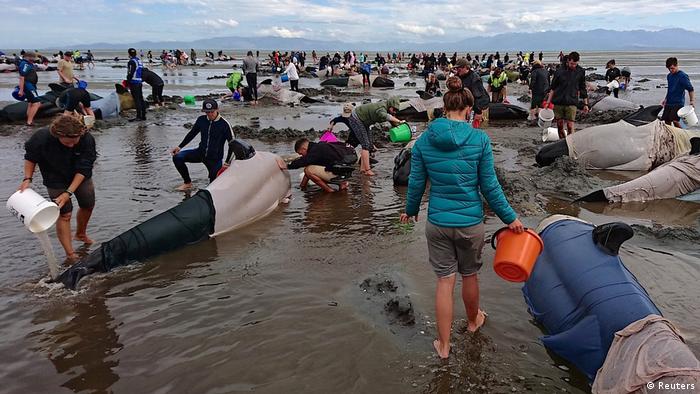
Every helper is welcome — the mammals must remain cool and moist
How can you help stranded whales and dolphins?
When a whale stranding is discovered, there is usually not much time left. Teams of helpers can do little more than try to cool the stranded animals, keep them moist and combine forces to get the heavy animals back into the sea as quickly and gently as possible.
In some countries, hotlines have been set up so that as many helpers as possible can be mobilized quickly. For many exhausted animals, however, even these immediate measures often come too late.

WATCHING WHALES - WITH DRONES
Science from above
To learn more about the whales' behavior, researchers with NOAA - the National Oceanic and Atmospheric Administration - have started using drones. The high-tech devices offer a new insight into the animals' hunting techniques and social behavior. This picture shows a family of orcas off the Canadian coast.
Many people who contracted the coronavirus disease struggle with long-term health issues. Maria Alzenir, a Sao Paulo local, got infected in July but is still dealing with a chronic shortness of breath and muscle pains.

Maria Alzenir Lima was released from hospital one month ago. The 53-year-old Sao Paulo local has officially recovered from her COVID-19 infection, yet still struggles with a persistent cough and shortness of breath. Getting around is a serious challenge. And after all this time, she still needs supplemental oxygen.
Alzenir — a nurse by training — spent 40 days in hospital. Her husband, who contracted SARS-CoV-2 as well, was hospitalized one day after her. He died on August 4 from heart and kidney complications brought about by the illness.
"I still cannot believe it. When I was hospitalized, my husband was still doing fine," says Alzenir. "I find it hard to grasp that he will not be at home when I go back." Alzenir has not yet returned to her own house but has been living with her daughter Barbara Lima since being discharged, as she requires round-the-clock care.
Read more: Pandemic deepens precarity for Brazil's domestic workers
Weak muscles
Last week, when the global coronavirus death toll passed 1 million, with 140,000 of those deaths recorded in Brazil alone, Alzenir did her 10th physiotherapy session at her daughter’s home to deal with the consequences of her long hospital stay. Alzenir's leg muscles have grown weak and walking is difficult for her. She says that immediately after being discharged, she could not even stand upright. Now, at least, she can walk a few steps, she says.
Prolonged hospital stays take their toll on the entire body, says Marli Sartori, an infectious disease specialist at Brasilia's Santa Lucia hospital. "COVID-19 patients in intensive care usually need three to four weeks until they can be discharged," she says, adding that additional therapy is then needed for a full recovery.
Alzenir's relatives pay the equivalent of €12 ($14) each week so she can take private therapy sessions, as no physiotherapists covered under Brazil’s publicly funded health care system, known as SUS, were available. Costs for Alzenir's care will rise even further, as she will also have to see a lung specialist.
Read more: Coronavirus: Is a repeat COVID-19 infection possible?
Chronic cough
For now, however, her relatives do not want to risk taking her outside. "I was concerned from the very beginning — but now that I have lost my father and almost my mother, I am even more careful," says her daughter. "She can cope without supplemental oxygen but what if she starts feeling unwell when we are outside?"
Alzenir still cannot eat proper food, as swallowing gives her pain. She is also dealing with a persistent cough. But her physiotherapist Evelyn Felisari says this is not a sign that the illness is recurring, but results from the two weeks she spent on a respirator, as the device irritates the larynx receptors. She says Alzenir's lung has also been strained, along with her diaphragm. "The goal is to get patients back in shape within a month, though this always varies depending on the person."
A study by South Korea’s Disease Control and Prevention Agency found that nine out of 10 COVID-19 patients suffer from long-term issues like fatigue or a loss of smell and taste after recovering from the illness. Some 26% of those who participated in the study reported suffering from chronic fatigue, making it the most common long-term symptom. Nature, a weekly science journal, cites a further study revealing neurological damage caused by the virus. And according to a Japanese study, COVID-19 may also damage brain tissue.
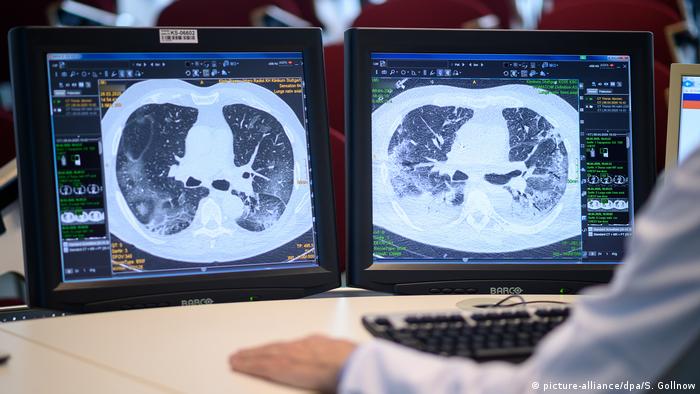
COVID-19 can cause fluid buildup in the lungs, as seen in the right-hand image
Long-term health problems
Some 300 studies have been devoted to investigating the potential long-term health implications of COVID-19. Among the most severe suspected consequences is aphasia — the inability to comprehend or formulate language due to damage caused to certain brain regions — along with strokes and seizures.
Germany’s public health agency, the Robert Koch Institute (RKI), cautions that it is still too early to make reliable statements regarding the pathogen’s long-term effects and whether it causes irreversible damage. Even so, if what many studies suggest is right, thousands, or even tens of thousands of former COVID-19 sufferers will end up struggling with ongoing health issues, perhaps for the rest of their lives. The initial belief that SARS-CoV-2 only damages people's respiratory tracts has been abandoned. Germany's RKI warns on its website that the virus can cause damage in a variety of ways, affecting lungs, kidneys, the liver and heart.
And that may not be all. Maria Alzenir appears to suffer from short-term memory loss. "Yesterday, she asked me why one of our relatives has not visited us — even though he came by just yesterday," recalls her daughter Barbara. Since contracting the virus, Alzenir also suffers from insomnia, a problem she did not have before.

Maria Alvenir has been left with several long-term effects
Maria Alzenir and her relatives live in Sao Paulo’s Sapopemba district, which has a population of some 300,000. It has seen some of the country’s highest coronavirus infection and mortality rates. Over 520 deaths were recorded here until early August alone, including that of Alzenir's husband, Jose Wellington de Sousa.
Alzenir says her late husband, who was 69, implored her to stop working amid the pandemic. He had told her they could scrape by on his pension. "But I did not want that, so every day, I took the overcrowded bus to work," says Alzenir. Now, in hindsight, she wishes he had listened to him.
Read more: Opinion: Bolsonaro lets 100,000 die of COVID-19 in Brazil
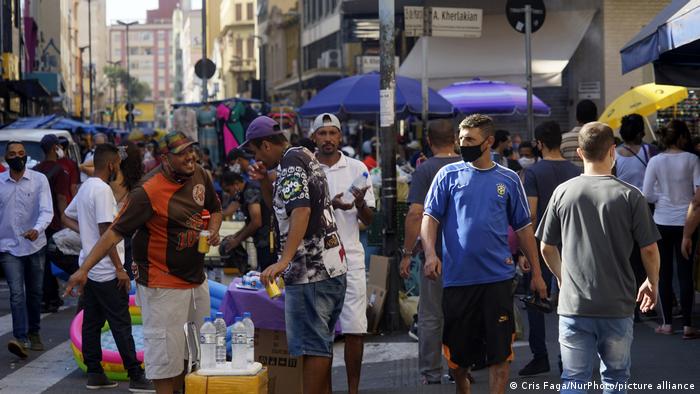
Many people in Brazil are going about their lives as if there was no pandemic
No more social distancing
After weeks of constantly high infection rates, Sao Paulo state is seeing a gradual flattening of the curve. Even so, the region is not out of the woods. According to Dados Transparentes – a Brazilian public health website — Sao Paulo state recorded some 32,000 new infections and 1,070 deaths in the last seven days. Indeed, while social distancing measures caused the infection curve to sink again in many countries, Brazil has seen infection rates remain at a consistently high level, and the country has now recorded almost 5 million confirmed cases and 146,00 deaths.
Despite these grim figures, many Brazilians have been flocking to the country’s beaches and bars to socialize and party after lockdown restrictions were lifted. Maria Alzenirs’s daughter-in-law Tamires is deeply concerned by this recklessness. "Although many people in our street are infected, some of them keep partying," she says.
But Alzenir herself can empathize with their need to relax and enjoy life. After all these months, she, too, would love to head out for a cold beer, she says.
Read more: Brazil: Rio postpones Carnival over coronavirus
This article was translated from German by Benjamin Restle.
Correction: The original version of this article mistranslated a sentence that said Alzenir's relatives pay €12 per week for physiotherapy because Brazil's public health care system, SUS, does not cover physiotherapy. The passage has been corrected to reflect that Alzenir's relatives pay the weekly amount because a physiotherapist covered under SUS was not available.
Ruth Klüger, who survived the concentration camp in Auschwitz as a child and wrote a memoir about her time there, has died.

Holocaust survivor, author and German literary academic Ruth Klüger died aged 88 in California on Wednesday.
The Austrian-born professor had lived in the United States since 1947. She was the author of the bestselling memoir "Still Alive" about her childhood under the Nazi regime.
Klüger gave a speech at the German parliament in 2016, saying it was an "honor" to speak in front of Chancellor Angel Merkel. She praised the refugee policy of Merkel's government, describing it as "heroic."
"This country, which 80 years ago was responsible for the worst crimes of the century, has won the praise of the world today thanks to its open borders and the generosity with which you have taken in and are still taking in refugees," she said.
Klüger was interned at the camp at Theresienstadt and later Auschwitz.
Read more: Auschwitz's harrowing history
She also spoke about the forced sex work in concentration camps that many women were forced to take on, and then faced stigma for after the war.
Austrian President Alexander Van der Bellen wrote on Twitter that "another voice has been silenced," calling her an "impressive author, intellectual and witness of the times."
Klüger, who was born to a Jewish family in Vienna in 1931, was also a vocal critic of the remembrance culture surrounding the Holocaust. She argued that sometimes Germany and Germans tried too hard to identify with the victims of the era, and in doing so reduced them to that status.
"I'm not from Auschwitz, I come from Vienna," she once said, adding that this was one reason she opted to have the internment number tattooed on her arm removed in later life.
In the United States, she studied English and German literature and became a recognized authority on German literature, in particular the poet Heinrich von Kleist.
Klüger died in her long-time home in Irvine, California.
A previous version of this article stated that in her speech to the Bundestag, Klüger talked about her own experiences as a forced sex worker in concentration camps. In fact, Klüger was speaking about the experiences of other women. This error has been amended.
By Helier Cheung
BBC News
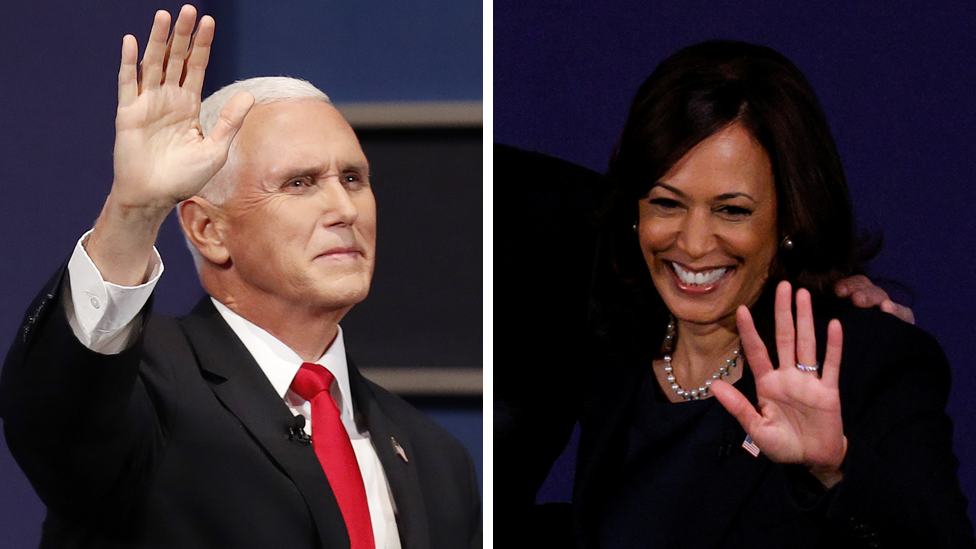
Wednesday night's vice-presidential debate was widely seen as civil, but with few memorable moments.
Yet one exchange that resonated strongly with many viewers - especially women - was when Kamala Harris responded to Mike Pence interrupting her by smiling and saying: "Mr Vice-President, I'm speaking… If you don't mind letting me finish, then we can have a conversation."
In fact, Ms Harris responded to an interruption with the phrase "I'm speaking" on three occasions.
Many considered these to be poignant moments that chimed with their own experiences of seeing women struggling for air time, or being interrupted by men in work situations.
“Mr. Vice President, I’m speaking” @KamalaHarris is every woman who has ever been talked over in her workplace. #VPDebate #GenderLens2020— Jennie Sweet-Cushman (@jenniesweetcush) October 8, 2020

One takeaway from tonight's debate will be how many times a woman of color, always smiling pleasantly, has to tell a white man, "I'm speaking," in order to STILL get less time than he gets. It is nauseating.— Mark Harris (@MarkHarrisNYC) October 8, 2020

Ms Harris was "clearly prepared" for interruptions, says Deborah Tannen, a linguistics professor at Georgetown University and expert in gender differences in language use.
She came across as "respectful" by saying "Mr Vice-President", while "I'm speaking" was not accusatory in the way "stop interrupting me" would have been, Dr Tannen told the BBC.
"Clearly her challenge throughout the whole debate was to avoid coming across as aggressive," she said.
"There's a double bind for women - because anything you do to come across as a forceful candidate violates expectations for women. I think she walked that fine line extremely well."
So what are the facts - and did gender play a role?
Mr Pence interrupted Ms Harris more than she interrupted him - a CBS tally found the vice-president interrupted the California senator 10 times, while she interrupted him five times.
Meanwhile, NBC news tracked nine interruptions by Ms Harris, and 16 interruptions by Mr Pence.
But these figures pale in comparison to the number of interruptions during the presidential debate between Donald Trump and Joe Biden last week.
According to one Washington Post tally, Mr Trump made 71 interruptions compared with Mr Biden's 22.
Given that the raucous Trump-Biden debate was almost universally criticised, it's not surprising that Mr Pence and Ms Harris appeared to make an effort to keep their exchanges civil.
But a CBS tally still found that Mr Pence ended up with more speaking time - 38 minutes, to Ms Harris' 35 minutes.
The moderator, USA Today's Susan Page, was criticised for failing to stop both candidates, particularly Mr Pence, from interrupting, especially as Mr Pence often exceeded the time limits for speaking.
At one point, Ms Harris fought to speak and said: "He interrupted me, and I'd like to just finish, please."
Previous studies have suggested that gender can play a role - often subconsciously - in how much people interrupt.
One 2014 study found that speakers tend to interrupt more when speaking with a woman rather than a man , while a 2017 study found this trend even existed at the top - with male Supreme Court justices interrupting female justices three times more than they interrupted each other.

And women can face a double bind when they fight to be heard - because studies suggest women who interrupt are penalised more harshly than men who speak out of turn, and powerful women can incur a backlash when they speak more than others.
A well-documented phenomenon, says Dr Tannen, is that "when women talk equally to men they're perceived as talking more" - presumably because people expect them to speak less.
Another factor, she adds, is that "frequently, women will give way more quickly than men will" when being interrupted.
But gender isn't always the only factor at play. Mr Trump interrupted Mr Biden more than 70 times in last week's presidential debate, compared to the 51 times he interrupted Hillary Clinton during the first presidential debate in 2016.
And in the 2016 vice-presidential debate, Democrat Tim Kaine interrupted Mr Pence 70 times, compared to Mr Pence's 40 times.
What about ethnicity?
Ms Harris is the first black, and Asian, vice-presidential candidate - and many believe she was also conscious of stereotypes about ethnic minority women when responding to interruptions.
"There's this trope of the angry black woman and she knows she has to avoid that," Melissa Michelson, a political science professor at Menlo College, told Mercury News.
Meanwhile, commentator Jessica Yellin praised Ms Harris on Instagram, writing: "The challenge for women, and for the first woman of colour to be on a major presidential party ticket especially, is to take back your time without media and swing voters calling ya "difficult" "tough" "aggressive." Answer: Do it with confidence, a smile and gleam in your eye."
Serena Williams and 'angry black women'
Helping women ensure their voices are heard
Of course, not everyone was impressed with Ms Harris' debate performance, or the way she and Mr Pence interacted.
One focus group of undecided voters, asked to describe the candidates in one word, chose words including "calm", "bland", "presidential", "comfortable" and "typical politician" to describe Mr Pence, and "evasive", "abrasive", "snarky" "too rehearsed" and "unpresidential" for Ms Harris.
Frank Luntz, who organised the focus group, told Fox News that, while voters were frustrated with the vice president for repeatedly running over his allotted time, "Harris' reactions to Pence - the smiling, the smirking, the scowling" left them far "angrier".
"It was clear that Mike Pence was the winner of tonight's confrontation," Mr Luntz, who has mostly worked for Republican clients in the past but is not working for any political party in the 2020 election, added.
By contrast, a CNN instant poll of registered voters found that 59% felt Ms Harris had won, while 38% preferred Mr Pence.
Are viewers influenced by gender and ethnicity?
media captionHarris and Pence ‘dodge questions’ during the vice-presidential debate in Utah
It's difficult to say - but the same CNN poll certainly found that women had a better impression of Ms Harris than men.
After the debate, 56% of men and 70% of women polled had a favourable impression of Ms Harris - while 50% of men and 32% of women had a favourable impression of Mr Pence.
And whether or not gender and ethnicity have influenced voters' perceptions, they certainly seem to have had an impact on media coverage of Ms Harris.
One recent study described "sexist and racist bias" in how the news of Mr Biden's vice-presidential pick was covered.
TIMES UP Now, which describes itself as an independent charity focused on improving work environments for women, said its study found that nearly two-thirds of media coverage mentioned race and gender, compared to just 5% of coverage in 2016 for Mr Pence and Mr Kaine.
A large proportion of this coverage would have reflected the historic nature of the nomination - given Ms Harris was the first black and Asian VP pick and one of only a few female candidates.
However, a quarter of the media coverage of Ms Harris included "racist and sexist stereotyping and tropes", including the "Angry Black Woman" trope and "birther" conspiracies, TIMES UP Now said.
"This shows that when white men are running for elected office, their identity is viewed as the "default" for leaders in our society," it added.
So - how can you deal with interruptions?
media caption A lesson in managing a presidential debate from two primary school teachers
Dr Tannen argues that, for political debates, "the solution has to lie not with the candidates, but with the moderators and organisers".
She suggests switching off candidates' microphones when their time is up - or, "if a candidate speaks over their allotted time, give that amount of time to the other candidate, immediately".
Meanwhile, in the workplace, "the best thing is if a woman can have a partner, female or male, who will speak up for her".
It's a lot easier for somebody else to say "I'd like to hear what she has to say", than for the interrupted person to say "let me finish", Dr Tannen adds.



